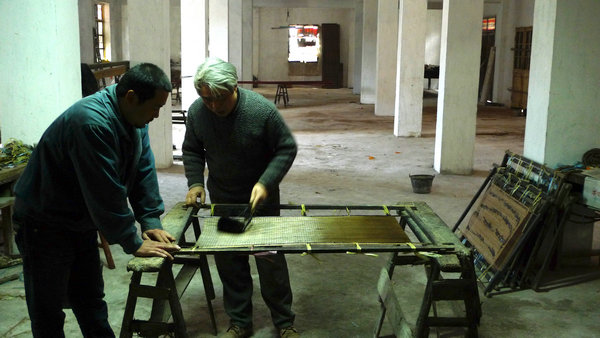 |
|
Cheng Xiaochun (left) and his father work on a mold for making rice paper. The family has carried on the traditional craftsmanship for generations.[Photo provided to China Daily] |
"These people were not born into the business, but they excelled because they already had an impeccable understanding of the essential spirit of craftsmanship," Cheng says of the olden-day artisans.
Their history of migration, social problems and a lifestyle that's slowly fading are all part of Cheng's narrative today. Other than being a government-recognized master craftsman, Cheng is a grower of Chinese herbs and a tai chi practitioner. The artisan life aside, Cheng still keeps his day job at a local urea factory.
"It will give me security if things look down," Cheng says. "It also allows me to choose the zhilian-making jobs I want."
He does not accept offers to make "very bad or very good" paper as he says it is "impossible" to make paper like it used to be made in the past in China.
For example, long wang xuan ("dragon king" paper), a piece of royal rice paper that reportedly spans more than 40 meters in length, is one of the many ancient pieces of paper people nowadays hope to re-create.
"History books say it took more than 100 craftsmen working in sync. It's the result of a whole nation's efforts. How can it be re-created now by me alone?"
That said, Cheng's plan for the coming years until his retirement is reviving lost paper. His father retired at age 70, when his eyesight-a crucial faculty for the craft-failed him.
"I can't tell what people after me would do with them, but I hope to leave them with some samples, like paper made of silk ... that no longer exist.
"Paper-making, as any other trade, is constantly changing and evolving," he says. "After all, it's made for use. So it's natural for one thing to die out and another to come into fashion.
"That's why I don't have a favorite paper or mold. Each one is special, functional in its own time."
Cheng's understanding of his trade is presented in The Lacing of Life, the first installment of a three-part, award-winning documentary on the art of making molds.
"There is a reason why workshops and apprentice-style handicrafts are longstanding," says Lei Jianjun, the film's director and an associate professor at Tsinghua University.
Factories seldom produce the same results, he says.